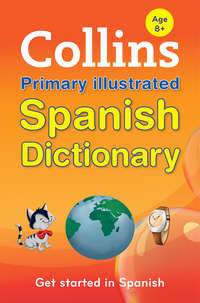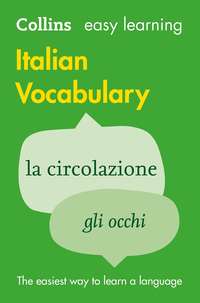
Полная версия
Easy Learning Italian Conversation
• If you’re in a hurry, you can hop on the train and buy a ticket directly from a ticket inspector. This will cost you more, however. If you contact the inspector as soon as you get on the train or before the first stop the fine is around 5 €; otherwise you’ll be faced with a more expensive fine of 60 € or more.
• Queues tend to be informal in Italy. So if you’re trying to get to an information desk and don’t know if it’s your turn, just ask Tocca a me?. If you want to let someone in before you, you can say prego, dopo di lei (after you).
Home from home
Buonanotte! – Sleep well!
If you’re going to stay in Italy, the phrases in this unit will provide you with the language you need to help you find the sort of accommodation you want and ensure everything is to your satisfaction when you’re there. We’ll also give you a few tips on what the receptionist or your landlord or landlady may say to you.
ASKING FOR THINGS
To say what kind of accommodation you want in Italian, use vorrei (I’d like), or, if you want to be slightly more direct, voglio (I want). These come from the verb volere (to want). For more information on volere, see here.
I’d like…
Vorrei una stanza con balcone.I’d like a room with a balcony.Vorrei prenotare una camera doppia per due notti.I’d like to book a double room for two nights.Vorrei fermarmi tre notti.I’d like to stay three nights.Vorrei prenotare una stanza nel vostro agriturismo per due settimane.I’d like to book a room in your agriturismo for two weeks.I want…
Voglio un appartamento luminoso.I want a flat with plenty of light.Voglio cambiare stanza; quella che mi avete dato è troppo rumorosa.I want to change rooms; the one you gave me is too noisy.Voglio un rimborso.I want a refund.Non vogliamo una stanza che dia sulla strada.We don’t want a room overlooking the road.When you want to find out if something is available, use Avete…? (Do you have…?) or Avreste…? (Would you have…?). These come from the verb avere (to have). For more information on avere, see here.
Do you have…?
Avete informazioni su dove alloggiare?Do you have any information about accommodation?Avete camere libere?Have you got any rooms free?Avreste degli asciugamani, per favore?Would you have any towels, please?C’è accesso ad Internet?Have you got internet access?If you want to ask for something, you can use Mi dà..? (Can I have…?).
Can I have…?
Mi dà la chiave della stanza, per favore?Can I have the key to my room, please?Mi dà una ricevuta, per favore?Can I have a receipt, please?Ci dà una lista degli alloggi disponibili?Can we have a list of available accommodation?Mi potrebbe dare ancora due asciugamani?Could I have two more towels?If you are asking someone whether they can do something for you, use Può…? (Can You…?) and Potrebbe…? (Could You…?) or, more informally, Puoi…? or Potresti…?. They all come from the verb potere (to be able). For more information on potere, see here.
Can you…?
Può darmi conferma della prenotazione per posta elettronica?Can You confirm the booking by email?Mi può svegliare alle sette, per favore?Can You give me an alarm call at seven o’clock, please?Potrebbe cambiare gli asciugamani, per favore?Could You change the towels, please?Potrebbe farmi vedere la stanza, per favore?Could You show me the room, please?Would you mind…?
Le dispiacerebbe mostrarmi come funziona il forno?Would You mind showing me how the oven works?Le dispiacerebbe chiamarmi un taxi?Would You mind calling a taxi for me?Le dispiacerebbe portarmi la valigia in camera?Would You mind taking my suitcases up to my room?TALKING ABOUT YOURSELF
When you are enquiring about somewhere to stay you will need to give information about yourself. Use sono (I am) to talk about yourself and siamo (we are) to include the people who are with you. These come from the verb essere (to be). For more information on essere, see here.
I’m…
Sono una studentessa.I’m a student.Sono canadese.I’m Canadian.Sono del sud dell’Inghilterra.I’m from the south of England.Siamo in vacanza.We’re on holiday.Siamo i proprietari.We’re the owners.My name is…
Mi chiamo Brian Gallagher.My name is Brian Gallagher.Mi chiamo Olivia Green.My name is Olivia Green.Sono la signora Smith. Ho prenotato una stanza doppia per questa notte.My name is Mrs Smith. I’ve booked a double room for tonight.Il cognome è Morris…My surname is Morris……e il nome è Emma.…and my first name is Emma.Si scrive M-O-R-R-I-S.It’s spelt M-O-R-R-I-S.BUONO A SAPERSI!
Remember that the Italian alphabet is pronounced differently from the English alphabet. For more information on how to say letters of the alphabet in Italian, see here.
ASKING FOR INFORMATION
When you want to find something out about your accommodation, an easy way to ask questions is just to put È…? (Is…?) before what you want to know. Alternatively, you can simply make your voice go up at the end of the sentence.
Is it…?
È caro?Is it expensive?È un hotel moderno?Is it a modern hotel?È lontano?Is it far?La colazione è compresa nel prezzo?Is breakfast included in the price?Le spese sono comprese nell’affitto?Are bills included in the rent?You can use C’è…? in Italian to ask Is there…? and Ci sono…? to ask Are there…?.
Is there…?
C’è un posto per mangiare qualcosa qui vicino?Is there anywhere near here where we can get something to eat?C’è un ascensore?Is there a lift?C’è un balcone?Is there a balcony?Ci sono toilettes per disabili?Are there disabled toilets?Use cerco (I’m looking for) or cerchiamo (we’re looking for) to ask where something is. cerco comes from the verb cercare (to look for).
I’m looking for…
Scusi, cerco il campeggio.Excuse me, I’m looking for the campsite.Cerco una pensione per stanotte.I’m looking for a B&B for tonight.Cerchiamo l’Hotel Bellini.We’re looking for the Hotel Bellini.To get more specific information, you may need to ask Quale…? (What…?), Dove…? (Where…?) or A che ora…? (What time…?).
What…?
Qual è l’indirizzo del proprietario?What’s the landlord’s address?Qual è il numero dell’agenzia immobiliare?What’s the number for the letting agency?Quale mi raccomanda?Which one would You recommend?Quali stanze hanno vista mare?Which rooms have a sea view?BUONO A SAPERSI!
quale works for all singular nouns, whether masculine or feminine. It becomes qual before a word beginning with a vowel, as in Qual è…? (What’s…?).
Where…?
Dov’è il bar?Where’s the bar?Dov’è la palestra?Where’s the gym?Dove sono gli ascensori?Where are the lifts?Dove trovo una presa per il portatile?Where can I plug in my laptop?What time…?
A che ora è servita la cena?What time’s dinner?A che ora chiudete il portone la sera?What time do you lock the doors at night?Entro che ora bisogna liberare la stanza?What time do we have to vacate the room by?Fino a che ora è servita la colazione?What time do you serve breakfast till?How much…?
Quanto viene una camera doppia a notte?How much is a double room per night?Quanto viene la pensione completa?How much is full board?Quanto verrebbe affittare un appartamento per tutto luglio?How much would it be to rent an apartment for the whole of July?How many…?
Quante camere con bagno vi sono rimaste?How many en-suite rooms have you got left?Quanti letti ci sono nella camera famigliare?How many beds are there in the family room?ASKING FOR PERMISSION
Often when you are staying in a hotel or other accommodation you will need to be able to ask whether you can do something. Use Posso…? (Can I …?) or Possiamo…? (Can we…?) to ask if you can do something. These come from the verb potere (to be able). For more information on potere, see here.
Can I…?
Posso vedere la stanza?Can I see the room?Posso lasciare le valigie qui per cinque minuti?Can I leave my suitcases here for five minutes?Possiamo usare la piscina?Can we use the pool?Possiamo piantare la tenda qui?Can we camp here?You can use Si può…? to ask if something is okay, or possible.
Is it okay to…?
Si può parcheggiare qui?Is it okay to park here?Si può fumare in camera?Is it okay to smoke in the room?Si può mangiare fuori?Is it possible to eat outside?Do you mind if…?
Le dispiace se parcheggio la macchina qui fuori per un minuto?Do You mind if I park my car outside for a moment?Le dispiace se pago con la carta di credito?Do You mind if I pay by credit card?Le dispiace se prendiamo la camera al piano di sopra?Do You mind if we take the room on the next floor?If you want to ask someone if you may do something, you can also use È permesso..? (Am I allowed to…?) followed by the infinitive.
Am I allowed to…?
È permesso ricevere ospiti?Am I allowed to have guests?È permesso usare la griglia?Are we allowed to use the barbecue?È permesso usare il telefono?May we use the phone?Ci è permesso portare il cane?Are we allowed to bring our dog?SAYING WHAT YOU LIKE, DISLIKE, PREFER
When talking about what you like, use mi piace (I like) with singular nouns and mi piacciono with plural nouns. To say what you don’t like, use non mi piace or non mi piacciono. These come from the verb piacere.
I like…
Mi piace cenare all’aperto.I like having dinner outside.Mi piacciono gli alberghi piccoli.I like small hotels.Mi piacciono i campeggi in montagna.I like campsites in the mountains.Mi piace tantissimo questa pensione.I love this guest house.I don’t like…
Non mi piace questo albergo.I don’t like this hotel.Non mi piace viaggiare in traghetto.I don’t like going on the ferry.Non ci piace pianificare tutto in anticipo.We don’t like to plan everything in advance.I hate…
Odio questo arredamento.I hate this decor.Odio le grandi catene alberghiere.I hate big chain hotels.Detesto non avere il bagno.I hate not having a bathroom.If you want to say what you prefer, use preferisco (I prefer) or preferirei (I’d prefer). These come from the verb preferire. For more information on -ire verbs like preferire, see here.
I prefer…
Preferisco questo hotel.I prefer this hotel.Preferisco stare presso una famiglia.I prefer to stay with a family.Preferiamo gli ostelli ai campeggi.We prefer youth hostels to camp sites.I’d rather…
Preferirei stare in centro.I’d rather be in the town centre.Preferiremmo abitare in campagna.We’d rather live in the country.Preferirei non dover far file.I’d rather not have to queue.Preferirei dividere un appartamento piuttosto che abitare da sola.I’d rather share a flat than live on my own.EXPRESSING OPINIONS
You may well be asked what you think of your accommodation. Whether it’s perfect or not up to scratch, to say what you think you can use penso che (I think) or trovo che (I find) followed by the subjunctive. These come from the verbs pensare (to think) and trovare (to find). For more information on -are verbs, see here, and for the use of the subjunctive, see here.
I think…
Penso che la camera sia un po’ piccola.I think the bedroom’s a bit small.Penso che la casa sia molto accogliente.I think the house is very welcoming.Trovo che ci sia troppo rumore la notte.I find there’s too much noise at night.Ho trovato il servizio eccellente.I found the service excellent.In my opinion…
A mio avviso, costa troppo per quello che è.In my opinion, it costs too much for what it is.Secondo me, fa proprio per noi.In my opinion, it’s just what we want.Secondo me, la stanza è troppo piccola.In my opinion, the room is too small.A mio avviso, è completamente inaccettabile.In my view, it’s totally unacceptable.MAKING SUGGESTIONS
If you would like to suggest that you do something, use posso (I can) followed by the infinitive and se vuole (if You like) – or se vuoi for a person you know well – at the end. posso comes from the verb potere (to be able). For more information on potere, see here.
I can…, if you like.
Posso darle conferma delle date domani, se vuole.I can confirm the dates tomorrow, if You like.Posso mandarle un acconto, se vuole.I can send You a deposit, if You like.Possiamo cercare un altro albergo, se vuoi.We can look for another hotel, if you like.If you wish to ask what someone would like you to do, you can use Vuole che…? (Would You like me to…?) or, more informally, Vuoi che…?, followed by a verb in the subjunctive, which you can find out more about on here.
Would you like me to…?
Vuole che paghi in contanti?Would You like me to pay cash?Vuole che le mostri la prenotazione?Would You like me to show you my booking?Vuoi che ti aiuti con le borse?Would You like me to help you with your bags?Vuole tenere i passaporti?Would You like to keep our passports?ASKING FOR SUGGESTIONS
You may want to ask for advice or a recommendation concerning your accommodation. To ask for advice, use Mi consiglia…? (Would You advise me to…?). This comes from the verb consigliare (to advise).
Would you advise me to…?
Mi consiglia di prenotare in anticipo?Would You advise me to book in advance?Mi consiglia di portare qualcosa da mangiare?Would You advise me to bring something to eat?Ci consiglia di portare dei sacchi a pelo?Would You advise us to bring sleeping bags?Would you recommend…?
Mi consiglierebbe questo hotel?Would You recommend this hotel?Mi consiglierebbe questa agenzia immobiliare?Would You recommend this estate agency?Ci consiglierebbe di affittare settimanalmente?Would You recommend that we rent by the week?Ci consiglierebbe di prendere un appartamento in città?Would You recommend us to take a flat in town?SAYING WHAT YOU HAVE TO DO
If you want to say that you have to do something with regard to your accommodation in Italian, you use devo (I have to) or dovrei (I ought to), from the verb dovere (to have to). For more information on dovere, see here.
I have to…
Devo prendere nota dell’indirizzo dell’albergo.I have to write down the address of the hotel.Devo passare alla reception per pagare.I have to go to reception to pay.Dobbiamo partire domattina alle sei.We have to leave at six tomorrow morning.BUONO A SAPERSI!
The word domattina is a contraction of domani (tomorrow) and mattina (morning).
I ought to…
Dovrei scaricare la macchina.I ought to unpack the car.Dovrei fare il bucato.I ought to do a load of washing.Dovremmo alzarci entro le sette di mattina.We ought to be up by seven am.Dovremmo avere un doppione delle chiavi.We ought to have a spare set of keys.In Italian you can tell somebody what you need by using ho bisogno di (I need).
I need…
Ho bisogno di una culla.I need a cot.Ho bisogno di telefonare al mio ufficio a Londra.I need to call my office in London.Abbiamo bisogno di una camera al piano terra.We need a room on the ground floor.You can use Devo …? (Do I have to…?) followed by the infinitive, or Bisogna che…? (Do I need to…?) followed by the verb in the subjunctive to ask about what you have to do. For more information about the subjunctive, see here.







